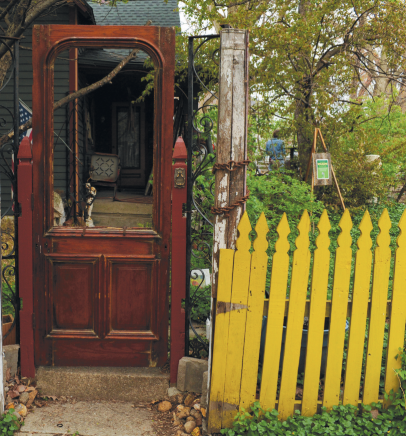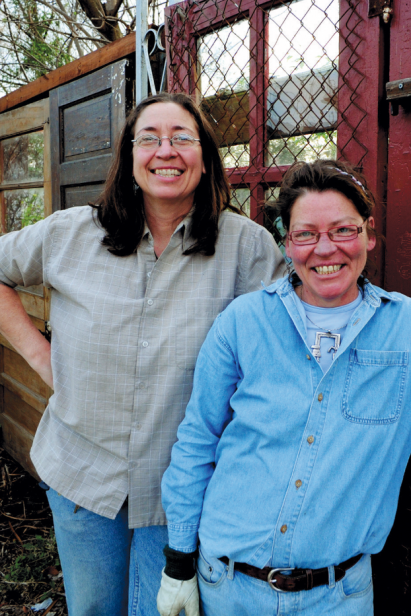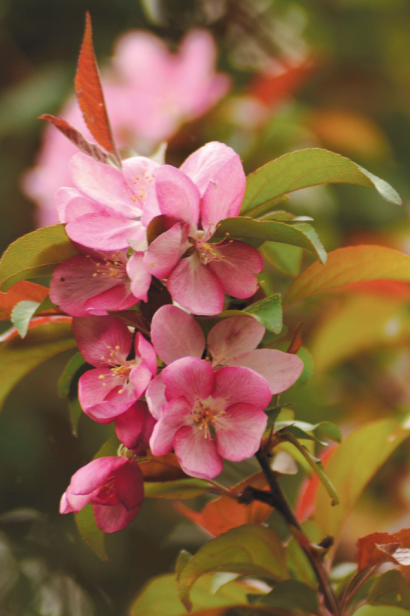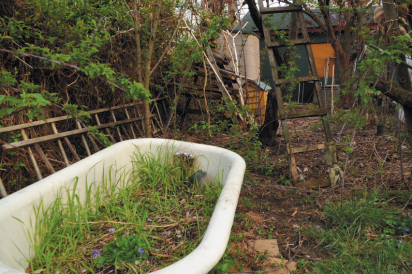Fruit Loop Acres: A Hidden Gem on the Near Eastside
Two miles east of the circle in a Near Eastside neighborhood dotted with neglected foreclosures, vacant lots and otherwise rundown homes, there is a bright spot called Fruit Loop Acres.
On a ¾-acre lot sits a 99-year-old home, surrounded by the fruit farm that gives the property its name. This is not your conventional fruit farm, with tidy rows of trees and bushes stretching on and on.
Beyond the cheery yellow fence that separates Fruit Loop Acres from the sidewalk, the lot seems almost wild, with plants mingling with and propped up by items salvaged from the alleys in the neighborhood– stone statues, children's toys, headboards and more. It's as though the plants have seized a forgotten yard sale.
In Fruit Loop Acres, there are cherry trees and black raspberry bushes. Apricot, plum and apples trees are scattered throughout. Grape and passion fruit vines wind around the trunks and stubby branches of dead peach trees. Sweetgrass shoots up out of an old bathtub.
From May through October, about 500 pounds of fruit are harvested from the urban farm, including about 120 pounds of black raspberries and up to 100 pounds of cherries.
Fruit Loop Acres is, in a word, unexpected. And that's just how owners Kay Grimm and Sue Spicer like it.
FRESH OR FROZEN
"There's food everywhere here," Spicer says, walking the property on a late March day that feels nothing like spring. It is snowing. Grimm points to ground where sunchokes, asparagus, rhubarb and stinging nettle will grow in the coming months. Elderberries, dewberries, white Niagara grapes and Indiana bananas, or pawpaws, are on their way, too.
The produce that is harvested supplies the couple's small community- supported agriculture (CSA) program called Basic Roots. Want to get a closer look? They also offer U-pick by appointment for cherries and black raspberries (e-mail basicroots4u@yahoo.com to schedule).
Grimm started Fruit Loop Acres because she wanted to know where her food came from. Now, it seems, everyone wants to know. The title on her business card says "agripreneur," and it's true: She's always thinking of ways to get locally grown food to Indy residents year-round.
Last year, Grimm and Spicer began freezing fruit and selling bags of it for the first time at the Indy Winter Farmers' Market and the indoor Binford Farmers' Market. In the summer, they drive through Near Eastside neighborhoods in an orange cargo-style golf cart filled with produce for sale, like a farmers' market on wheels.
April Hammerand, program manager of the Food Coalition of Central Indiana, likens the mobile market to an ice cream truck: both draw people out of their homes and get neighbors to interact. Hammerand says Fruit Loop Acres has bettered its community, which she calls a "food desert" when it comes to accessing local fresh food.
"Kay and Sue are great representatives of how a community should act," Hammerand says. "Food brings people together."
HEY, NEIGHBOR
Spicer is president of the neighborhood where they live, the Willard Park of Holy Cross-Westminster Civic Alliance. Though their ¾-acre property is large–that's about five lots in their neighborhood combined, they estimate–it isn't their only source of fruit.
"You feel like you're growing something bigger than yourself"
Grimm and Spicer forage from other properties in their neighborhood, and include their finds in CSA packages, frozen fruit bags and the roaming farmers' market. Indy businesses have partnered with Fruit Loop Acres to use the found fruit in their products.
Foraging starts with a walk through the neighborhood in the spring. Grimm spots a tree that is flowering, and can determine what type of fruit it will produce later. If the property is abandoned, the fruit is wild and free for the taking. When there is a homeowner, Grimm and Spicer introduce themselves, let the owners know that they have, say, persimmons growing in their yard and ask if they'd like to share.
Typically, the tree has been planted a generation or more ago and forgotten. Owners die, move away or are simply disinterested in what's growing.
"People are leery of eating the food off the trees, even in their own backyard," Spicer says.
In the past, they have foraged crab apples and juiced them for Indy's Sun King Brewing Company, which used the juice in a fall beer called Crab Apple Wit.
BLANK CANVAS
Grimm grew up on her great-grandfather's farm in northern Illinois, and after a career with the U.S. Air Force, she returned to farming.
She bought the property that would become Fruit Loop Acres in 1994.
"It was pretty much a blank canvas," she says. "Just a bunch of overgrown weeds."
Since then, she has worked to establish Fruit Loop Acres using the principles of Permaculture, a method of planning that is purposeful, sustainable and designed to work with nature, not against it. What might look random and overgrown to a passerby is actually a well-timed symphony, with Grimm as the conductor.
The property is a certified wildlife habitat, a designation that helps to protect their style of farming.
Grimm and Spicer say they have good relationships with public agencies that might be curious about what they do.
"Every time we get a new health inspector, we give them a tour of the property," Spicer says.
Spicer, who joined Grimm in running Fruit Loop Acres five years ago, says they both feel a responsibility to the community. They have a hand in many local food organizations, and Spicer has helped the Food Coalition of Central Indiana write a food charter that, among other things, would make it easier for people to create and maintain urban gardens. Grimm has had a hand in a number of community gardens, too.
The couple has also encouraged some small farmers in the area to make their food available year-round so that it could be included in Basic Roots, the CSA they launched in 2005. Their push for sustainability started with Fruit Loop Acres, but has moved beyond the yellow fence. "You feel like you're growing something bigger than yourself," Grimm says.








